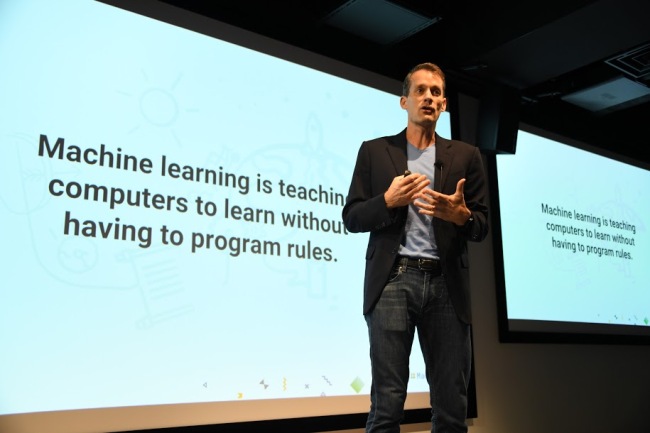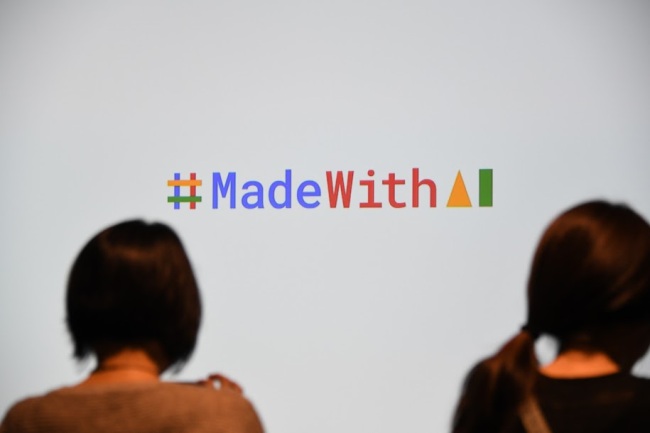Recent advancements in artificial intelligence technologies combined with countless sci-fi films depicting worlds where machines take over humanity have stoked continued fears about a future driven by AI.
While debate persists over the kind of benefits, or destruction, artificial could bring, one of Google’s chief AI technology experts says the current fears are irrational, and the main focus now should be to build better systems with wider applicative value.
“The long-term fears (of artificial intelligence) don’t seem rational to me at the moment. It’s not the main source of concern as of now,” Jeff Dean, head of the Google Brain team that focuses on AI and machine learning research, told reporters in Tokyo on Tuesday.
“(Rather,) I think the question of ‘narrow AI’ is definitely where we are now. The systems we have now are good at one thing or another. We’re trying to build an AI that can be more useful across wider domains,” he said during Google's annual #MadeWithAI conference for the Asia-Pacific region.
 |
Jeff Dean, a Google Senior Fellow and head of the Google Brain team (Google) |
According to the veteran Google engineer, the “same techniques and precautions used in traditional software programming (to ensure a program runs properly) can be used to deploy safe AI systems.”
In the long run, machine learning can automate tasks that are more repetitive and simplistic, and in turn enable people to do more in conjunction with technology, he suggested.
While AI-driven automation will lead to some job loss -- as has been the case with new technologies in the past -- Dean believes it will also create entirely new jobs unknown as of now.
His optimistic outlook on artificial intelligence align with the broad direction of Google, which has set out to lead in “a world that is AI-first, a world where computing becomes universally available,” as put by Google CEO Sundar Pichai.
The California-based tech giant aims to leverage such technologies to make its products more useful, help businesses and external developer innovate, and to support researchers in tackling humanity’s biggest challenges, Dean said.
 |
(Google) |
Leading the push is Google Brain, the team responsible for developing and experimenting with various forms of machine learning and neural networks to make computers smarter.
Machine learning, the most widely used form of artificial intelligence, refers to computer algorithms that can learn to perform particular tasks on their own, rather than operating based on hand-coded rules programmed by humans.
The most popular form of machine learning is deep learning, which uses artificial neural networks -- layers of interconnected nodes -- that rearrange themselves as new information comes in. This complex method allows computers to recognize patterns and make conclusive observations on their own, without the need for human programming.
AI experts from Google provided updates on how machine learning algorithms are being used to improve its key products and solve problems across different industries.
For instance, Google Maps leverages AI-powered vision technology to create maps with only satellite imagery and street views, allowing it to build viable maps in places where official street information is unavailable.
For YouTube, AI-based natural language processing algorithms are used to automatically caption videos uploaded on the platform to benefit users who are deaf or hard of hearing.
In health care, Google is using deep learning to
train machines to analyze medical images and automatically detect pathological cues, be it swollen blood vessels in the eye or cancerous tumors.
As Google continues its artificial intelligence push, the company says it is seeking to train more computer scientists in machine learning to encourage further development in the field. It plans to launch by early next year a free, online “machine learning crash course” for the public.
The tech giant is also spearheading a project called AutoML, short for automated machine learning, with the goal of essentially building an artificial intelligence that builds other AIs.
By Sohn Ji-young (
jys@heraldcorp.com)






![[Exclusive] Hyundai Mobis eyes closer ties with BYD](http://res.heraldm.com/phpwas/restmb_idxmake.php?idx=644&simg=/content/image/2024/11/25/20241125050044_0.jpg)
![[Herald Review] 'Gangnam B-Side' combines social realism with masterful suspense, performance](http://res.heraldm.com/phpwas/restmb_idxmake.php?idx=644&simg=/content/image/2024/11/25/20241125050072_0.jpg)

